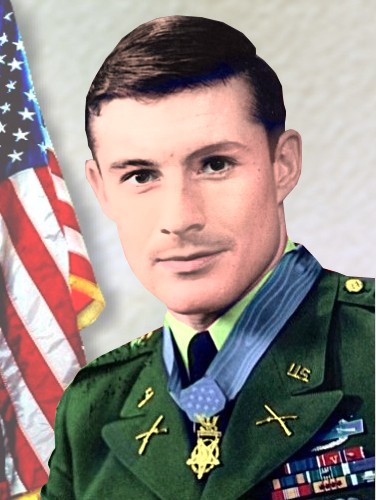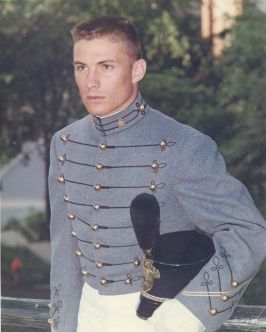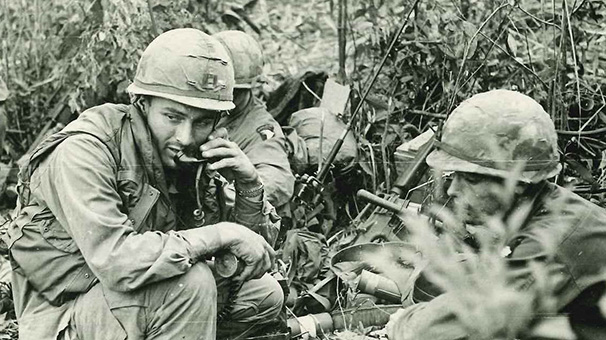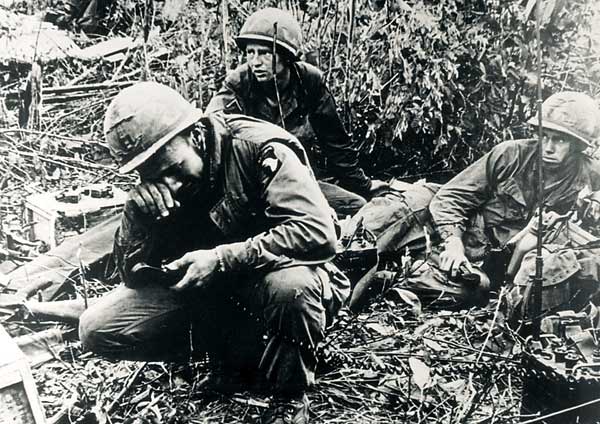It was the height of the Vietnam War. When the 3rd Battalion of the 187th Infantry decided to add a fourth company to their ranks, the other units took the opportunity to send their insubordinate or problem soldiers to the newly formed Company D. Thankfully for the men , the Army would place them under the command of Captain Paul Bucha.
A West Point graduate with a sharp mind and a passion for excellence, Capt. Bucha would turn his company into a formidable fighting force. After inserting into the Vietnam jungle in March of 1968, Capt. Bucha and Company D would inadvertently walk up on a Battalion of NVA (North Vietnam Army) in the middle the night and proved just how far this company of misfits had come.

Had the NVA known just how small the unit was, the American unit could have easily been overrun. Capt. Bucha directed the defense so as to make them seem larger during a night of intense fighting and for his actions preventing the annihilation of his 89 man company, Capt. Paul Bucha was awarded the Medal of Honor, his country’s highest award for bravery in battle.
A Bright Mind fit for a Fight
Paul Bucha was born in August 1943 in Washington D.C. Early on, Bucha displayed a strong academic mind and athletic abilities which would allow him to further his education after high school. Despite being an All-American swimmer with multiple scholarship and offers to attend various schools, Bucha believed that service to his country should be his priority.
He was accepted to West Point where he would continue to swim and graduate in the top 5% of his class. After West Point, he picked up an MBA at Stanford and was quickly given a company to whip into shape for Vietnam.

Given command of the “Clerks and Jerks”, i.e. company D, Bucha believed that if the unit trained together, they would come together. The unit’s subsequent actions in combat would prove that true as company D would become one of the more decorated by the end of the war.
Bucha transformed this group of misfits into a highly disciplined and confident unit of men who trusted their leader and were ready for a fight. Perhaps they wouldn’t have picked taking on an large NVA battalion alone for their fight, but when it comes to war the enemy usually gets to have a say in most matters. The units they faced were the Don Nai Regiment and the 7th NVA regiment among other support elements.
The Unwelcomed Battalion
Coming off the heels of the Tet Offensive, Capt. Bucha and Company D were inserted by helicopter Southwest of Phuoc Vinh in Binh Duong Province of Vietnam on March 16th, 1968. Their mission was to seek out the enemy to initiate contact as the area was believed to be a stronghold for North Vietnamese forces. For two days Company, D would engage in minor firefights as they conducted a reconnaissance in force mission throughout the jungle.
However, on March 18th, the pace and intensity would quickly escalate into what could only be described as an all-out fight for survival. While seeking out the enemy, a lead element of company D suddenly came under heavy RPG, mortar, and machine-gun fire pinning them down with little hope of escape.
Capt. Bucha immediately proceeded to the front to assess the situation and he soon saw that he and his men were in for one heck of a fight.

The first priority was relieving the pressure on the men currently pinned down by heavy fire. Bucha noticed the majority of fire was coming from a concealed bunker proximally 40 meters to the front. He then crawled forward into the heavy fire and single-handedly destroyed the bunker with grenades in order to rescue his men.
His next priority was figuring out what his company now less than 89 men in strength could do against what he assessed to be a Battalion size force. He knew they could not withstand repeated human wave assaults in their current locations and he ordered company D to withdraw and create a more secure perimeter.
By his own admission, Bucha would recount that had the North Vietnamese Battalion known they were up only against a company, the unit would have been wiped out.
Throughout the night, Bucha would instruct his men who were in a widely dispersed pattern to throw grenades and set off Claymore mines to confuse the enemy and make their perimeter seem larger than it actually was.
Despite being wounded during his successful solo attempt to take out the initial bunker, Bucha continued to move up and down the lines throughout the fight and coordinate fire support throughout the night to keep the enemy at bay. However, Company D had already suffered a number of killed and more wounded who needed evacuation.
Despite the presence of heavy sniper fire, Capt. Bucha personally stood up and used flashlights in the middle the night to coordinate the landing of the medevac chopper. When morning came, the NVA Battalion had withdrawn as Bucha’s ruse to mask the size of his force had worked.
He then personally led recovery missions for the dead and those who were cut off during the night of fighting.
A Humble Spirit
After his return from Vietnam, Bucha began teaching at West Point and it was here in 1970 that he was notified he would be receiving the Medal of Honor for his actions in March of 1968. Initially, his first thought was to refuse the medal under the belief that he had done nothing out of the ordinary to receive it.
For Bucha, he was just protecting the men he had asked to trust him with their lives. It was only after the encouragement of a senior officer who reminded Bucha that this medal was not his to refuse.
This medal was for the men of Company D and he should wear it on behalf of them.

Capt. Paul Bucha wouldn’t go on to become a career military officer and resigned his commission in 1972 to pursue a career in business. And while his time in the military was relatively brief compared to many notable officers, his impact would forever be felt by the men of Company D.
The actions of officers matter greatly to the men led by them in combat and all the more so when they come head to head with a Battalion sized force of the enemy with only 89 men. But through exemplary leadership and conspicuous gallantry, Bucha would prove the trust he asked of his men was well placed in him.
They were no more a troublesome band of soldiers and they had Captain Paul Bucha to thank for it.
While Bucha’s heroics that day were notable, there were others worthy of the Medal of Honor, they include Medic Dennis Moore and Sgt Austin Harjo. Moore, who under heavy fire and severely wounded crawled out to the seriously wounded lead elements to administer medical attention. He was later killed. Sgt. Harjo was nominated for the Medal of Honor. There were also two Distinguished Service Crosses awarded to Lt Jeff Wishik and Medic Moore, and several Silver Stars awarded for this including ones to Calvin Heath and Paul Conner. In November 1968, 53 men of Delta Company were awarded Bronze Stars.